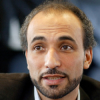Tariq Ramadan

Tariq Ramadan
Tariq Ramadanis a Swiss academic, philosopher and writer. He is the professor of Contemporary Islamic Studies in the Faculty of Oriental Studies at St Antony's College, Oxford and also teaches at the Oxford Faculty of Theology. He is a visiting professor at the Faculty of Islamic Studies, the Université Mundiapolisand several other universities around world. He is also a senior research fellow at Doshisha University. He is the director of the Research Centre of Islamic Legislation and Ethics, based in...
NationalitySwiss
ProfessionWriter
Date of Birth26 August 1962
CountrySwitzerland
There is an enormous amount of mistrust towards me. They say that what I'm saying is too good to be true, and that I must say something else when I speak in Arabic. Trust is missing, the progress made is not acknowledged.
If people who cherish freedom, who know the importance of mutual respect and are aware of the imperative necessity to establish a constructive and critical debate, if these people are not ready to speak out, to be more committed and visible, then we can expect sad, painful tomorrows. The choice is ours.
Muslims must speak out and explain who they are, what they believe in, what they stand for, what is the meaning of their life. They must have the courage to denounce what is said and done by certain Muslims in the name of their religion.
Our emotions are often beautiful, but they can also be dangerous. They represent our spontaneity, and seem to speak to us of our freedom.
It's clear there is nothing in my record supporting terrorism.
We all cherish freedom of speech, but with a reasonable approach and a reasonable use of it. If we come to this, it is a debate. If not, then it is a power struggle. Who is going to win, the Muslim principles or the Western principles?
I've never suffered because of my heritage in Europe.
Many U.S. organizations believe that I am being barred from the country not because of my actions but because of my ideas. The conclusion seems inescapable.
We've got to get away from the idea that scholars in the Islamic world can do our thinking for us. We need to start thinking for ourselves.
The rich stick together; the poor and the marginalised are thrown together.
The world is a complex place, and the influence of the media in its representation and its power of communication and interpretation is a remarkable amplifier of emotions, and of illusions.
Cultures, along with the religions that shape and nurture them, are value systems, sets of traditions and habits clustered around one or several languages, producing meaning: for the self, for the here and now, for the community, for life.
If religious people deny paradise to their opponents or to 'non-believers,' atheists would likewise seek to eliminate 'dangerous' believers with their 'childish' ways and their heads in the clouds.
South Africa never leaves one indifferent. Its history, its population, its landscapes and cultures - all speak to the visitor, to the student, to the friend of Africa.